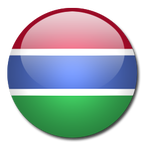International Headteacher
Menu
Full name: Republic of The Gambia
Population: 1.8 million (UN, 2011)
Capital: Banjul
Area: 11,295 sq km (4,361 sq miles)
Major languages: English (official), Mandinka, Wolof, Fula
Major religions: Islam, Christianity
Life expectancy: 58 years (men), 60 years (women) (UN)
Monetary unit: 1 dalasi = 100 butut
Main exports: Peanuts and peanut products, fish, cotton lint, palm kernels
GNI per capita: US $450 (World Bank, 2010)
Internet domain: .gm
International dialling code: +220
Population: 1.8 million (UN, 2011)
Capital: Banjul
Area: 11,295 sq km (4,361 sq miles)
Major languages: English (official), Mandinka, Wolof, Fula
Major religions: Islam, Christianity
Life expectancy: 58 years (men), 60 years (women) (UN)
Monetary unit: 1 dalasi = 100 butut
Main exports: Peanuts and peanut products, fish, cotton lint, palm kernels
GNI per capita: US $450 (World Bank, 2010)
Internet domain: .gm
International dialling code: +220
|
Since the adoption of capitalism, free markets and Western rule of law over the past decade or two, a growing number of African nations are slowly rising from the ashes of poverty to modern development and the creation of middle class.
Although Gambia is still suffering from the shackles of deficiency, its economy is steadily growing and offering tremendous business opportunities. Located in the western region of Africa, Gambia is a nation that has a vast amount of natural resource deposits that fills government coffers and allows residents to find positions of employment. Its primary industries are agriculture, tourism and resources, though its tourism sector has fallen quite a bit since the Great Recession. Despite the fact that it maintains roughly a $4 billion gross domestic product, nearly half of the country still lives under the poverty line and maintains a minuscule $2,000 per capita. Experts say this can be attributed to government instability and economic mismanagement by officials and corporations working in hand with the state. With a population of two million, there are an abundance of residents that want to seek a better life. This is enough motivation to acquire the middle class dream and thus lead to various business and market prospects. Communication The Gambian government has deemed English as the official language, but there are other cultural vernaculars spoken by citizens, such as Mandinka, Wolof, Fulo and other indigenous languages. When Gambians communicate with each other they tend to be indirect when they converse. In fact, it would be quite rare to find someone to speak directly without beating around the bush. For instance, if someone would like to borrow some money then they will explain their entire situation and then note that they have to perform a drastic measure to get the funds. Essentially, Gambians avoid confrontation and use sighs or repeat words when good or bad news is given. However, in relation to humour, Gambians are completely direct in their jokes. During conversations or initial meetings, it's important to stand at an arm's length, and if it's a talk between both genders then greater space is warranted. Also, it isn't uncommon to see the same genders hold hands when they talk because this is an indication of friendship. The protocol of eye contact varies. An example of this is when speaking to members of the same sex it is required to regularly maintain eye contact, but when speaking to seniors or authority figures then indirect eye contact is important. Dress Code For men, the dress code is pretty lax – men will generally wear pants with an untucked button downed dress shirt. For women on the other hand, they are obliged to sport a komplet, a conventional outfit that consists of a top with long or short sleeves, an ankle length skirt and a head tie. Greetings When men meet men for the very first time then they must shake hands with their right hand and hold onto the grip for an extended period of time. Older men are prompted to lead the younger men into conversation, while younger men have to address their senior counterparts with "Asalaamalekum". A simple greeting will suffice between women with an abrupt handshake. When men and women meet each other, then a verbal greeting and indirect eye contact are needed. It is unconventional for men to touch women and the other way around. Professional Titles & Business Cards It is very important for people to address each other as Mr., Mrs. and Madam when meeting individuals in business settings for the first time. When distributing your business cards and receiving others', it's crucial to remember to do so with your right hand. Punctuality There is one simple phrase to bear in mind when in Gambia: God willing. This means that no one is ever expected to be on time whether it's a formal gathering or a social affair. In Gambia, it is said in jest that GMT means Gambia Maybe Time or WAIT translates to West African International Time. Gambia is engulfed with tradition and religious customs, but it still adopts some Western influences in terms of apparel and business issues. Despite the ubiquitous matter of poverty, the country is laid back and its people refuse to take life too seriously (hence their views of time). |
information provided by www.bbcnews.co.uk & www.careeraddict.com

